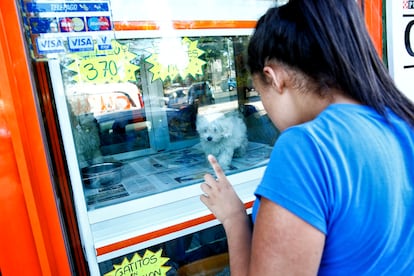Law change sees pets in Spain considered sentient beings, with welfare taken into account should a couple separate
More reforms are planned for this year, with the government aiming to bring about a shift in citizens’ relationships with animals


From today, Wednesday, animals will be considered in Spain to be sentient beings, meaning that they can no longer be seized, mortgaged, abandoned, mistreated or removed from one of their owners in the case of a separation or divorce. These changes are now in force under Spanish law and modify three pieces of legislation: the Civil Code, the Mortgage Act and the Civil Procedural Act.
These are not the only changes in the pipeline, however. The junior partner in the coalition government, Unidas Podemos, has had a draft animal welfare law prepared since October, and is hoping to see it approved in the coming months. That legislation includes more resounding measures, such as a ban on putting animals down without justified cause, a veto on the use of wild animals in circuses, and a ban on selling pets in stores. What’s more, a planned reform of the Criminal Code in Spain is due to make the punishment for animal abuse more harsh. This battery of measures is aimed at changing Spaniards’ relationship with animals.
Among the new measures that are in force from today are regulations over shared custody of animals should a couple separate. For example, a judge will be able to modify the conditions of an animal’s care when necessary, as well as establishing how the costs of the pet should be covered between the two parties, and even deciding on its destination should there be no agreement.
What’s more, judges will be able to limit parents’ access to children in cases of separation should they have mistreated their pets, either as a form of vicarious violence or gender violence in order to control or victimize their ex-partner or offspring.
Pets can also now be included in wills. But if they are not, they will be handed over to inheritors who reclaim them. If this is not possible, they will be given to either an administrative body or center that collects abandoned animals, until the inheritance procedures can be established. If none of the heirs want to take charge of them, the administration can hand them over to a third party for their care and protection.
The new legislation states that if anyone finds a lost animal, they should be handed over to their owner or the person in charge of their care, unless there are indications of abuse or abandonment, which must be communicated to the relevant authorities.
Meanwhile, the modification to the Mortgage Law excludes farm or industrial animals, as well as pets, from mortgages, while the change to the Civil Procedural Act prevents pets from being seized to cover unpaid debts.
Nuria Máximo, the director of the Professorship of Animals and Society at the Rey Juan Carlos University, believes that these changes reflect “how society is changing its vision of animals,” and respects them more and more. “There has been a change in the sensitivity of the population in terms of the way we treat animals, above all those that we live with. If you ask anyone they will know that their pet is not a thing, but the law did not reflect this until now, which is why there could be these absurd situations such as the ability to seize a horse,” she explains.
Animal protection associations see these reforms as very positive. Nuria Menéndez de Llano, the director of the Observatory for Animal Justice and Defense, which was behind the collection of signatures that preceded the current changes, believes that it is “right for this anachronism to be corrected.” “For them to be recognized as sentient beings is historic,” she continues. “Before they were reduced to the status of a thing, and now the law recognizes them as living things, with the ability to think and feel.”
The lawyer points out that with these changes, Spain is following in the footsteps of other European countries – such as France, Germany, Switzerland and Portugal – but with more advanced legislation. “It’s an intense reform, and one that is far reaching.”
Upcoming plans
The draft animal protection law from Unidas Podemos is due to reach the Cabinet in the coming weeks, before it begins to make its way through the lower house of parliament, the Congress of Deputies, over the course of this year.
The text is focused on pets, and will, among other measures, seek to avoid animals being put down without just cause – the effect of this would be to avoid the deaths of animals who end up in shelters and are not adopted by anyone.
Currently, between 150,000 and 300,000 animals are left abandoned in Spain every year. The draft law aims to combat this situation, by creating an animal protection registry, as well as another registry of people who work with them. There will be a third list of people who have been banned from possessing animals.
Two of the more controversial elements of the future law include the prohibition of leaving a dog without supervision for more than 24 hours, as well as the elimination of the list of dangerous dogs. José Miguel Doval, the president of the Spanish Royal Canine Society, believes that the supervision of dogs is difficult to monitor. “Animals should not be left alone, but trying to establish such strict criteria will be difficult to apply apart from when it is reported,” he says.
As for dangerous dogs, Doval is in favor of the future plan. “The current legislation is unfair,” he says. “Condemning a dog from birth, just because of its breed, to always have to wear a muzzle and a tighter leash is not acceptable. The future law seems better for us than what was there before.”
The other measures included in the future law include the aforementioned ban on wild animals in circuses, as is already in place in certain regions, as well as an end to the sale of pets in stores. What’s more, the breeding and sale of animals by ordinary citizens will be prohibited, meaning that only professionals can do so, subject to guarantees of animal welfare. The breeding of animals by private citizens contributes to the high number of abandoned animals.
The legislation will also establish the obligation to sterilize pets if they live with other animals of a different sex, and with whom they could reproduce. The law will also promote awareness campaigns against animal abuse and abandonment.
The reforms underway to the Criminal Code, which will toughen up the punishment for animal abuse, are still at the very early stage of public consultation. This is a transparency step that comes ahead of the reform’s passage through Congress.
Tu suscripción se está usando en otro dispositivo
¿Quieres añadir otro usuario a tu suscripción?
Si continúas leyendo en este dispositivo, no se podrá leer en el otro.
FlechaTu suscripción se está usando en otro dispositivo y solo puedes acceder a EL PAÍS desde un dispositivo a la vez.
Si quieres compartir tu cuenta, cambia tu suscripción a la modalidad Premium, así podrás añadir otro usuario. Cada uno accederá con su propia cuenta de email, lo que os permitirá personalizar vuestra experiencia en EL PAÍS.
¿Tienes una suscripción de empresa? Accede aquí para contratar más cuentas.
En el caso de no saber quién está usando tu cuenta, te recomendamos cambiar tu contraseña aquí.
Si decides continuar compartiendo tu cuenta, este mensaje se mostrará en tu dispositivo y en el de la otra persona que está usando tu cuenta de forma indefinida, afectando a tu experiencia de lectura. Puedes consultar aquí los términos y condiciones de la suscripción digital.








































